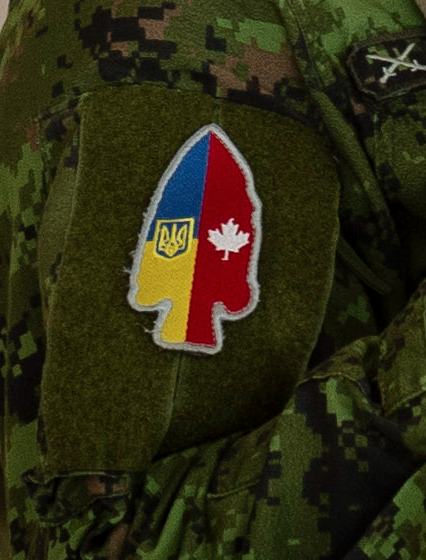This week’s Dispatch post from The Line includes some commentary on the story I linked to last week from the Ottawa Citizen, reporting that Canadian soldiers sent to Poland to train Ukrainian troops are being stiffed by the Department of National Defence on their food bills:

Operation Unifier shoulder patch for Canadian troops in Ukraine.
Detail from a photo in the Operation Unifier image gallery
Here’s a totally normal story from a well-functioning country that isn’t at all broken: it turns out that processing per diems for a hundred or so folks is now beyond the capability of the federal government.
This story came to us courtesy the Ottawa Citizen, where David Pugliese reported that the company sized unit of Canadian military personnel operating in Poland has seen months worth of expense filings go unpaid. In some situations, a military unit sent abroad would include its own logistical support team, including cooks. In other situations, a relatively small unit sent to a place with functioning civilian infrastructure is told to feed themselves and keep the receipts for reimbursement. For our troops in Poland, there to provide logistical and training support to Ukrainian forces since October, the government went the latter route.
And that’s fine. Really. Frankly, we’re sure the troops are happier eating out at local places and enjoying delicious Polish food — really, it’s amazing — than getting three servings of military slop a day. The problem, though, as these poor troops discovered, is that the military and national defence bureaucracy no longer has the ability to process the expense payments. So these balances are just sitting on their personal credit cards. For months.
[…]
The mission began in October.
It seems almost pointless to add much actual insight and analysis here. This kind of dysfunction speaks for itself. We’ll limit ourselves to two comments: operational deployments are incredible stressful on military personnel and their families on the homefront. That’s uncontroversial, and unavoidable. That’s why military service is recognized as a sacrifice even during peacetime deployments. The basic bargain we make with our servicemembers is while they are serving their country abroad, their country will take care of their families at home. Leaving these families with high-interest credit-card balances they can’t pay off because the Canadian government is too broken to reimburse soldiers for expenses they were told to incur is an on-the-nose failure of Canada to honour its debt to the the military parents, spouses and children who have been, in effect, ordered to advance the Canadian government money to subsidize military deployments.
The second comment we’ll make, is that this isn’t just further evidence in support of the Canada-is-broken thesis — it’s a very specific kind of break. We’ve all known that Canadian governments, at all levels, have struggled to turn new policies into new programs. That’s not new. But even granting that failure, we’ve generally been able to keep doing the things we already do. There seemed to be enough residual muscle memory in our governments. Can we do new things? No, not really. But we’ll keep doing the stuff we already do.
This military fiasco is alarming because it’s a sign that our state-capacity issues are now extending into areas that previously worked. Not only are we struggling to do new things, we’re forgetting how to do things we used to be able to do. This goes beyond what our typical gripes about state capacity. This is something else. This is state atrophy, or rot.
Now that the public is paying attention, we suspect we’ll see some reasonably rapid progress. The government will throw bureaucrats and maybe consultants at the problem until it goes away. This is how they have reacted to similar issues: we hurled ground staff at airport delays until they cleared, and bureaucrats at passport offices until the backlogs eased.
But we have to ask why we now require exceptional redeployments of staff to maintain typical levels of service. And we don’t like the answers we can come up with. Ottawa has added tens of thousands of civil servants, at an annual cost of tens of billions, in recent years. During that time Ottawa has also sharply ramped up spending on consultants; the annual cost now surpasses $20 billion.
And yet.
What the hell is going on?
I’ve been saying for literally years now, the more the government tries to do the less well it does everything, and this fiasco is a perfect example of that sclerosis spreading further.



